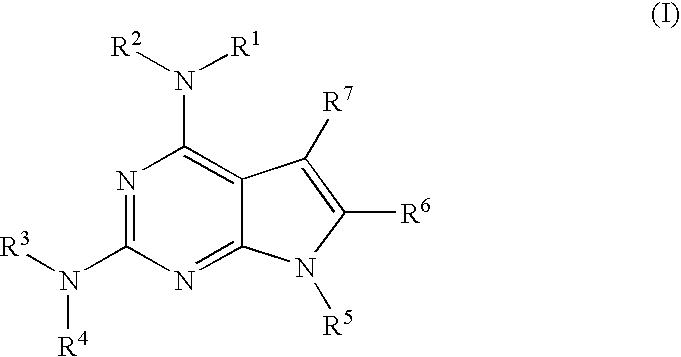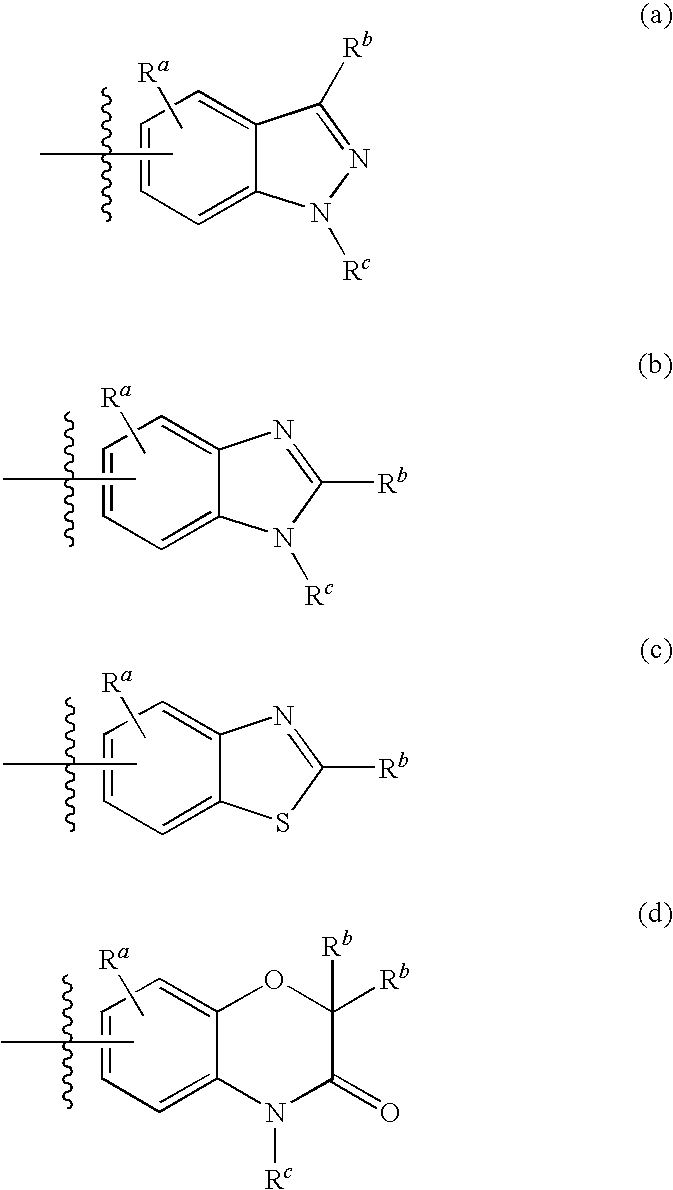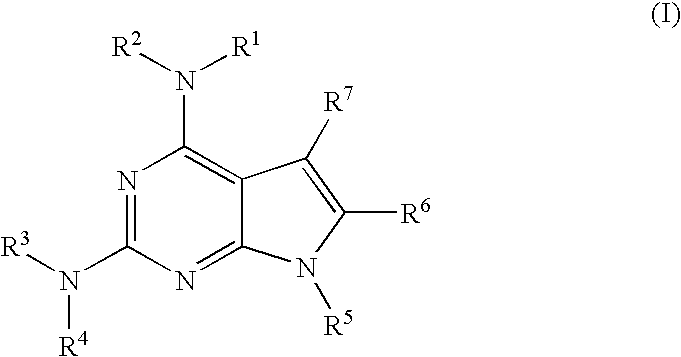Protein kinase inhibitors
a protein kinase and inhibitor technology, applied in the field of new drugs, can solve the problems of obstructing blood flow, all of the treated vessels are restenose, and injuring resident coronary artery smooth muscle cells (smcs), and reducing the effect of vascular space, so as to achieve the effect of reducing the number of patients
- Summary
- Abstract
- Description
- Claims
- Application Information
AI Technical Summary
Benefits of technology
Problems solved by technology
Method used
Image
Examples
example 1
1-(4-(4-(4-(1H-indazol-6-ylamino)-7H-pyrrolo[2,3-d]pyrimidin-2-ylamino)phenyl)piperazin-1-yl)ethanone and N4-(1H-indazol-6-yl)-N2-(4-(piperazin-1-yl)phenyl)-7H-pyrrolo[2,3-d]pyrimidine-2,4-diamine
[0188]
[0189]To a suspension of 6-aminouracil (15 g, 0.118 mol) in H2O (600 mL) was added sodium acetate (NaOAc) (15 g, 0.183 mol) and chloroethanal (ClCH2CHO) (50% in H2O, 30 mL). The mixture was heated at reflux for 4 h and then cooled to room temperature. The resulting dark brown precipitates were collected by filtration to afford crude 7H-Pyrrolo[2,3-d]pyrimidine-2,4-diol (14.4 g, 81% yield).
[0190]A suspension of 7H-Pyrrolo[2,3-d]pyrimidine-2,4-diol (2.25 g, 0.015 mol) in phenylphosphinic dichloride (PhPOCl2) (15 mL) was heated at 180° C. for 4 h. The resulting dark syrup was poured slowly to ice water, the black precipitates were filtered off, and the filtrate was extracted with ether. The ether layers were combined, washed sequentially with sat. NaHCO3, brine, dried over Na2SO4 and con...
example 2
1-(4-(4-(4-(3-methyl-1H-indazol-6-ylamino)-7H-pyrrolo[2,3-d]pyrimidin-2-ylamino)phenyl)piperazin-1-yl)ethanone and N4-(3-methyl-1H-indazol-6-yl)-N2-(4-(piperazin-1-yl)phenyl)-7H-pyrrolo[2,3-d]pyrimidine-2,4-diamine
[0195]
[0196]To a solution of 2-ethylaniline (12.1 g, 0.1 mol) in conc. H2SO4 (50 mL) at 0° C. was added fuming HNO3 (9.3 g) drop wise. After stirring at ambient temperature for 30 min, the mixture was poured into ice-water, and 2 N NaOH was added to neutralize the excess acid. The resulting reddish-brown solid was collected by filtration and washed with petroleum ether to give 2-ethyl-5-nitroaniline as crude product (9 g).
[0197]To a mixture of 2-ethyl-5-nitroaniline (2 g, 12 mmol) in acetic acid (AcOH) (60 mL) at ambient temperature was added a solution of tert-butyl nitrite (t-BuONO) (1.8 mL, 12 mmol) in AcOH (8 mL). After stirring at ambient temperature for 1 h, AcOH was removed in vacuo. The resulting residue was dissolved in ethyl acetate (EtOAc), washed with Sat. NaHC...
example 3
6,6′-(7H-pyrrolo[2,3-d]pyrimidine-2,4-diyl)bis(azanediyl)bis(2,2-dimethyl-2H-benzo[b][1,4]oxazin-3(4H)-one
[0202]
[0203]To a mixture of 2,4-dichloro-7H-pyrrolo[2,3-d]pyrimidine (0.038 g, 0.2 mmol) in n-butyl alcohol (n-BuOH) (1 mL) was added 6-amino-2,2-dimethyl-2H-benzo[b][1,4]oxazin-3(4H)-one (0.115 g, 0.6 mmol) and trimethylsilyl chloride (TMSCl) (4 drops). After heating for 3 h, the mixture was purified by preparative HPLC to give 6,6′-(7H-pyrrolo[2,3-d]pyrimidine-2,4-diyl)bis(azanediyl)bis(2,2-dimethyl-2H-benzo[b][1,4]oxazin-3(4H)-one (0.02 g, MS 500.2 (MH+)) (Compound 3-1).
PUM
| Property | Measurement | Unit |
|---|---|---|
| time | aaaaa | aaaaa |
| temperature | aaaaa | aaaaa |
| temperature | aaaaa | aaaaa |
Abstract
Description
Claims
Application Information
 Login to View More
Login to View More - R&D
- Intellectual Property
- Life Sciences
- Materials
- Tech Scout
- Unparalleled Data Quality
- Higher Quality Content
- 60% Fewer Hallucinations
Browse by: Latest US Patents, China's latest patents, Technical Efficacy Thesaurus, Application Domain, Technology Topic, Popular Technical Reports.
© 2025 PatSnap. All rights reserved.Legal|Privacy policy|Modern Slavery Act Transparency Statement|Sitemap|About US| Contact US: help@patsnap.com



